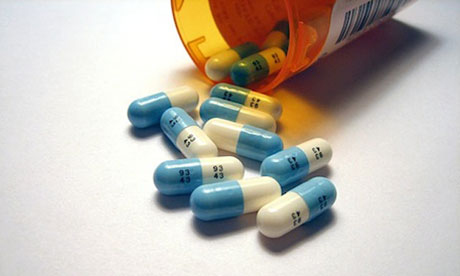
Lately, it seems as if everyone is anti-antidepressants. In a recent CiF article, Giles Fraser bemoaned the apparent need to treat anything vaguely resembling unhappiness with a pill. Just a week earlier, Will Self launched a scathing attack on psychiatry along similar lines.
Both pieces sparked debates and arguments centred around two issues. The first is a lack of understanding about what depression actually is. The second is whether antidepressants, which some argue are being unnecessarily prescribed to people with depression, are actually as effective as they're made out to be. It's a difficult debate to be had, because it is so often emotionally charged on both sides. The best thing that we can do is to look to the data for answers.
First and foremost, let's get this straight: depression is not simply "being sad" or "feeling down". Clinical depression is a persistent, often debilitating disorder that leaves the sufferer feeling sad or hopeless for weeks or months on end. In its "mild" form, it results in a loss of interest in once enjoyable things, tiredness, and near-constant low mood. In the most severe circumstances, it can leave a sufferer feeling suicidal. It affects 6.9% of the European population – some 30 million people – with about one in 10 healthy years of life lost either due to premature death or due to living with the disability. In short, it is a serious disorder.
But what sort of help is best? Are antidepressants any good? Well, this is where it gets complicated. There's an oft-cited meta-analysis from 2008 by Irving Kirsch and colleagues, which looked at the efficacy of four different types of antidepressant – fluoxetine, venlafaxine, nefazodone and paroxetine – compared with placebo. Critically, they used data from the US Food and Drug Administration, which is responsible for the regulation of drugs in America. This meant that they had access to all research data on the effectiveness of the antidepressants in question, and not just the positive results that are more likely to get published in academic journals.
Essentially, they found that antidepressants only provide a therapeutic improvement for people who have quite severe cases of depression. For people with mild depression, the authors suggested that there was no real benefit to using them.
However, critics have argued that the statistical analyses in Kirsch's paper were flawed, and biased against antidepressants. Furthermore, a similar, but less-often cited paper came out in the New England Journal of Medicine just a few weeks earlier than the Kirsch study, and finished with a different message. Headed up by Erick Turner, a former FDA employee, this meta-analysis also looked at the efficacy of antidepressants, but looked at 12 types of medication instead of four. They found a similar effect to that reported in the Kirsch paper, but the interpretation was very different. In using slightly different criteria for clinical significance, Turner's team concluded that antidepressants were generally superior to placebo, regardless of the severity of depression. It's just that when you take into account unpublished results, the efficacy of antidepressants, although still present, wasn't as great as published findings made out.
This is why it's difficult to say with any confidence what is actually going on with antidepressants. Some studies are statistically flawed, and some contradict each other, both in the interpretation but also in the findings (for example, a study from 2012 in JAMA by Gibson and colleagues argued that antidepressants are effective for mild or moderate depression). Drug manufacturers withhold data that show a lack of efficacy, as was the case with reboxetine in 2010.
Sadly, turning to other types of therapy doesn't provide a clearer answer. A recent meta-analysis looking at the efficacy of psychotherapies versus placebo pills suggested that they're no more effective than antidepressants – so whether you think psychotherapy works really depends on your stance about pills. Moreover, studies looking at psychological treatments such as cognitive behavioural therapy seem to suffer from the same problems with publication bias and withheld data as clinical trials of antidepressants.
All of this means that it's easy to cherry-pick evidence for your side of the debate. For the anti-psychiatry/anti-antidepressant crowd, Kirsch's meta-analysis – or rather, the interpretation of it – is solid evidence that pushing pills for depression is wrong. For the pro crowd, there are studies like the 2012 Gibson paper that you can cite in favour of their use – except there are problems with that study too. The truthful answer is that we don't really know how effective antidepressants are.
None of this means that antidepressants don't work. It just means that we don't know yet. It's a bit of a clichéd thing to say, but we really do need more research: more robust research that isn't influenced by monetary gains or emotional predispositions towards one outcome or another. Until we get those sorts of studies, inflammatory and ill-informed posts that berate the use of antidepressants, or which casually refer to "SSRI-munching depressives", only serve to stigmatise depression and isolate sufferers.
If you would like to find out more about depression, or talk to someone about it, please visit Mind's website, or Mindfull for 11-17 year olds

